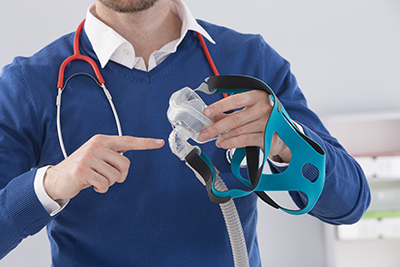Need Assistance? Call us today! 602-478-9713
In the wake of unprecedented restrictions associated with the COVID-19 global pandemic, clinicians and patients alike are asking; When it comes to minimizing the risk of spreading corona virus, how safe is a continuous positive airway pressure (CPAP) machine?

While acknowledging that CPAP is an excellent treatment for sleep apnea, members of the American Sleep and Breathing Academy (ASBA), Phoenix, Ariz., believe that added caution is appropriate for unusual times. ASBA members agree with the American Academy of Sleep Medicine (AASM) which recently wroteon its website: “It is possible that using CPAP could increase the risk of spreading the virus to others around you…Using positional therapy or an oral appliance (if the patient already has one)…may also be effective for some patients.”
The ASBA recommends strong consideration of oral appliances and positional sleep therapy as viable alternatives to CPAP. Part of the problem with CPAP is the shortage of filters and disposables now on the market. Additional difficulty with proper cleaning of masks causes more challenges when it comes to disinfection—with the situation made worse due to a shortage of distilled water.
Patients can clean oral appliances similar to the way dentures are washed, primarily by soaking appliances in denture cleaning solution which kills bacteria and germs. Users can also soak oral appliances in hydrogen peroxide which is effective in killing corona virus.
Another key difference between CPAP and oral appliances is that patients are not sharing oral appliances with anyone. At skillednursing facilities, assisted living homes, and even at apartment complexes that share centralized air—risks are increased through theuse of CPAP.
For those who are concerned about CPAP spreading the virus, and for those who need treatment for sleep apnea, CPAP alternatives can potentially save lives. For someone using CPAP therapy, we simply do not have a firm grasp as to how dangerous it can be at this time. However, we know the virus can spread much more effectively through CPAP than it can through the regular breathing fostered by oral appliances.
Even when masks are not leaking, patients are still getting air from surrounding areas because filters can't work with 100% effectiveness. Potentially everybody who has sleep apnea could be more susceptible to contracting the virus, and ASBA members agree that it’s important to get screened, get treatments, and weigh the pros and cons. With this in mind, we endorse oral appliance therapy and positional sleep therapy as safer treatments for the public, at least for now.
The above statement on behalf of the ASBA was authored by Chris M. Chui, D.D.S., co-founder of US Sleep Apnea, owner of San Francisco Dental Wellness, and a member of the ASBA Board of Directors. Dr. ChrisChui is double boarded in dental sleep medicine with the American Board of Dental Sleep Medicine and the ASBA.